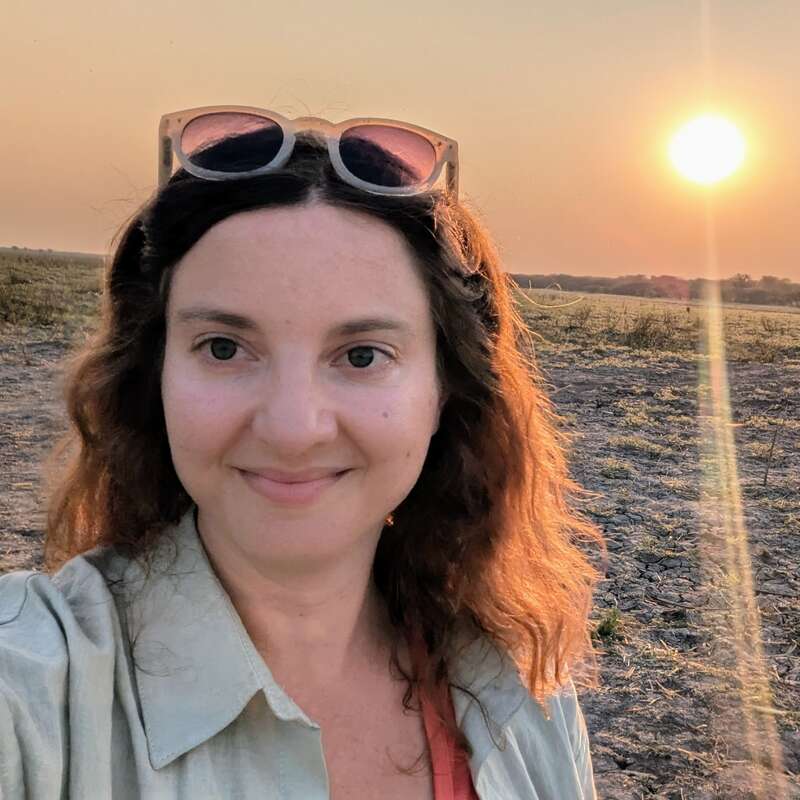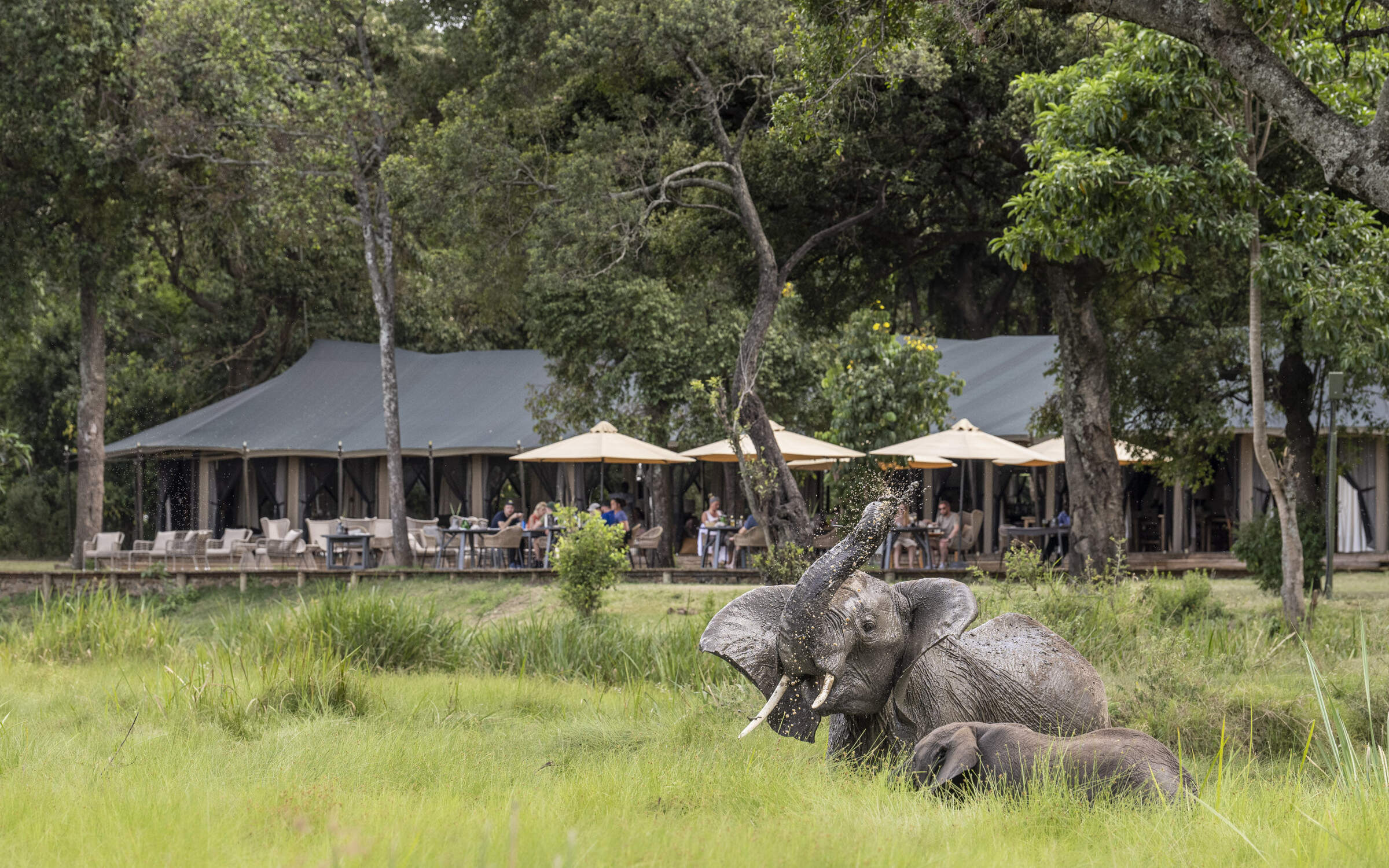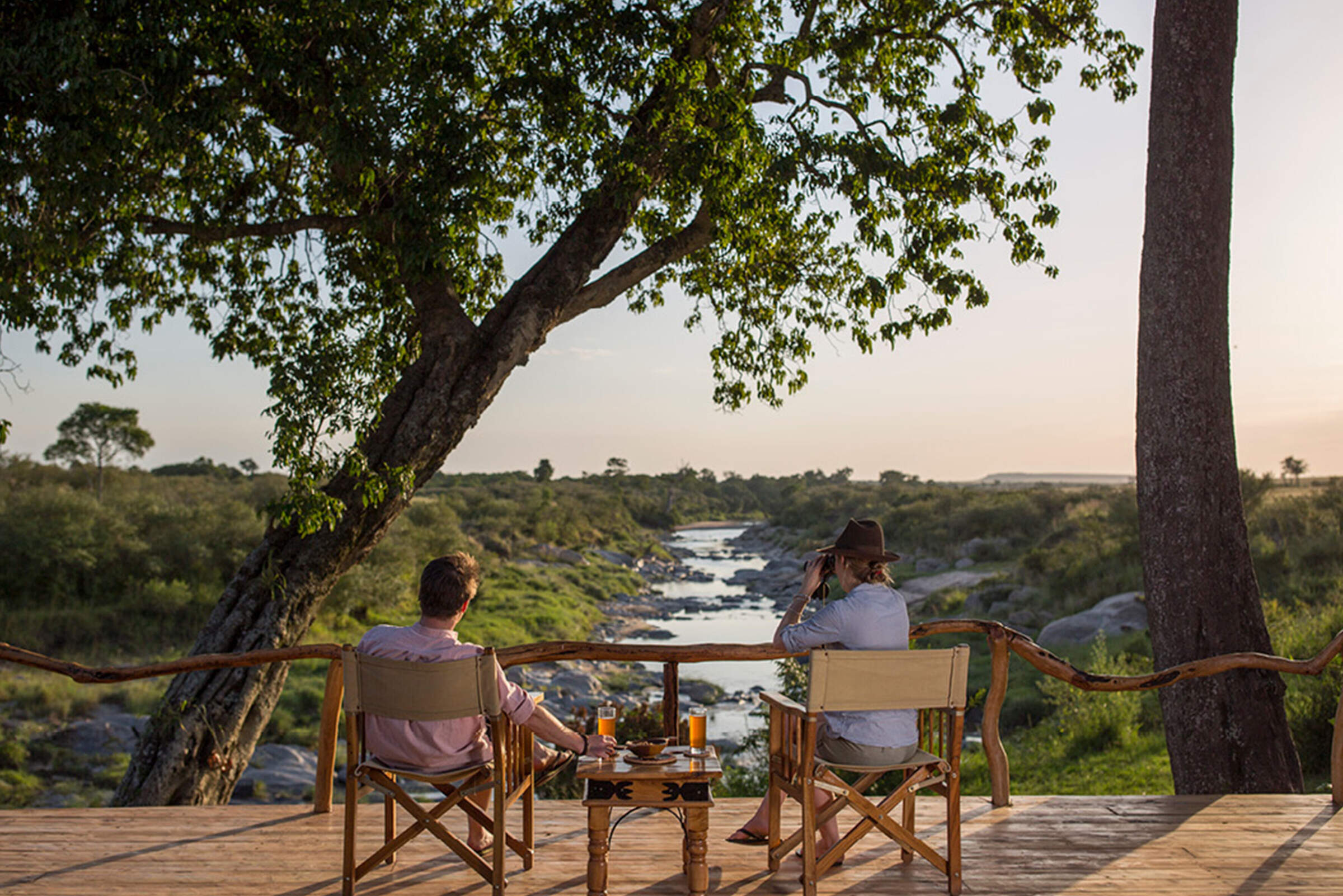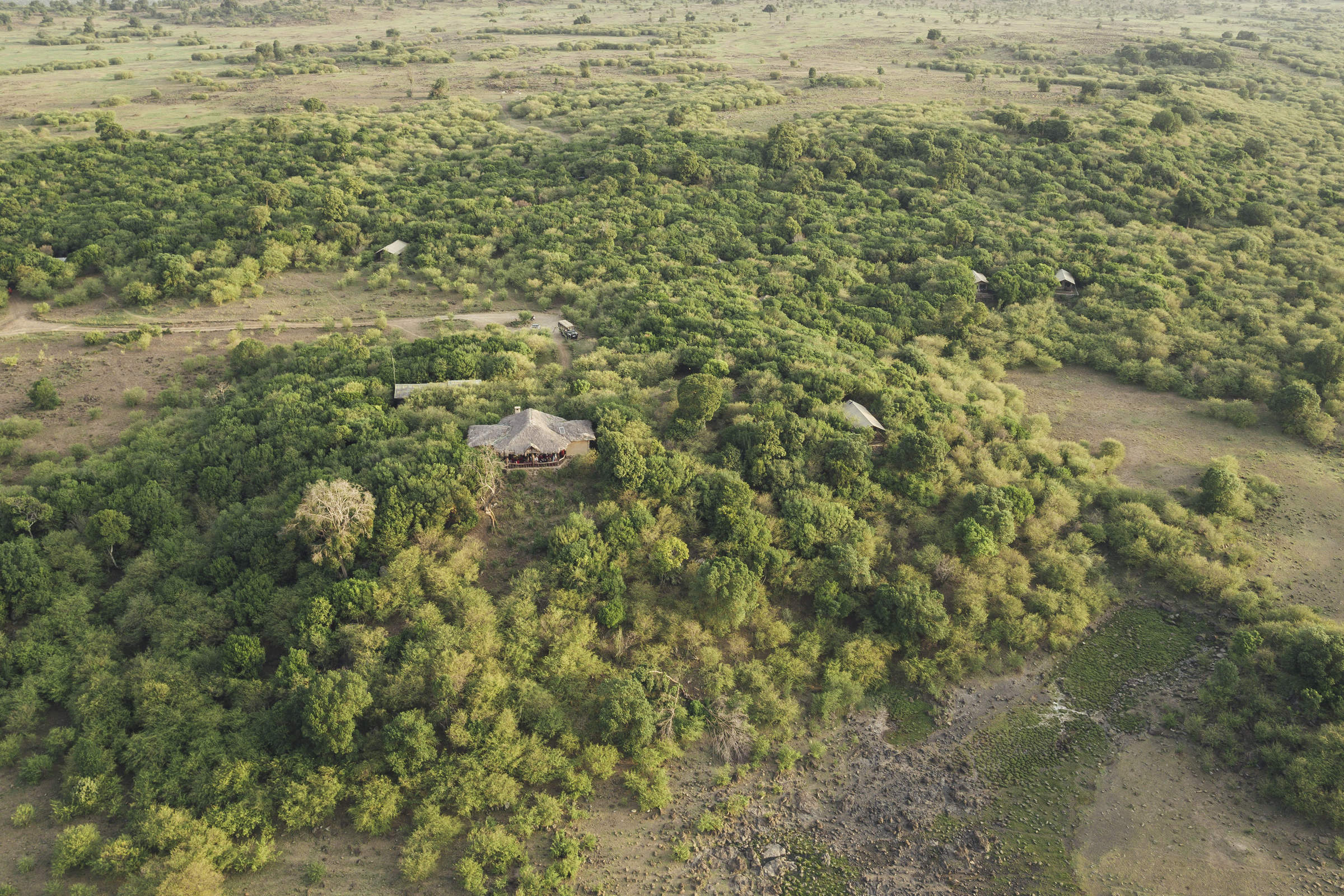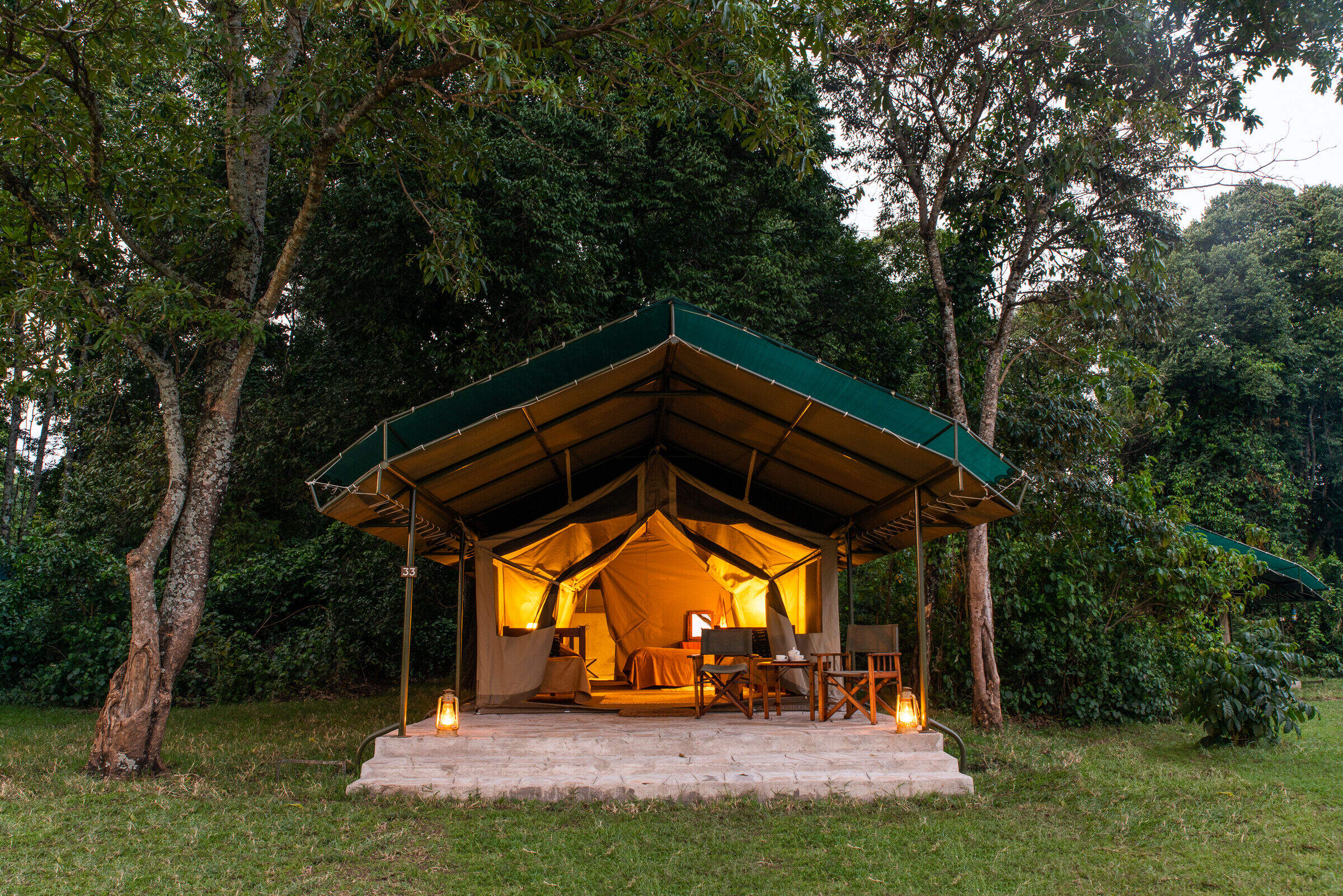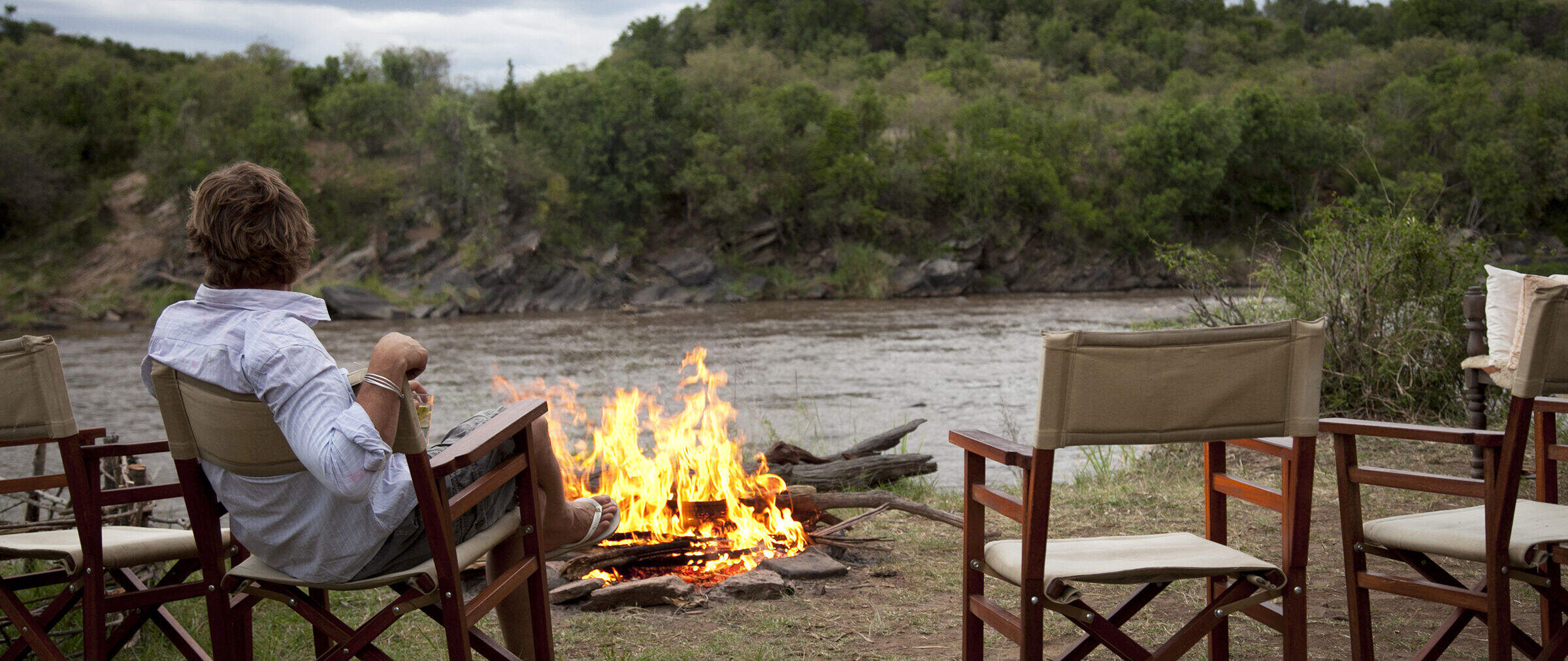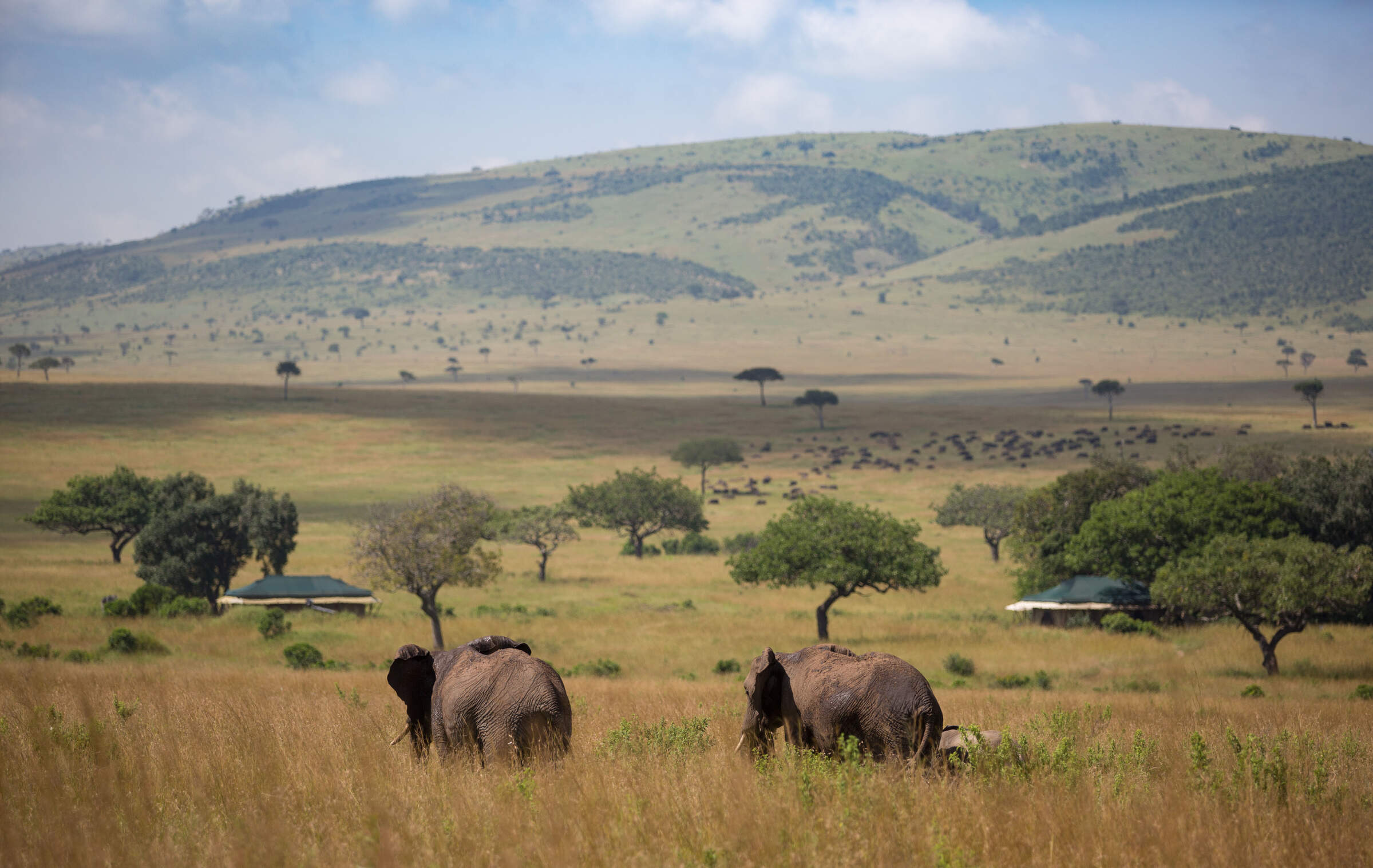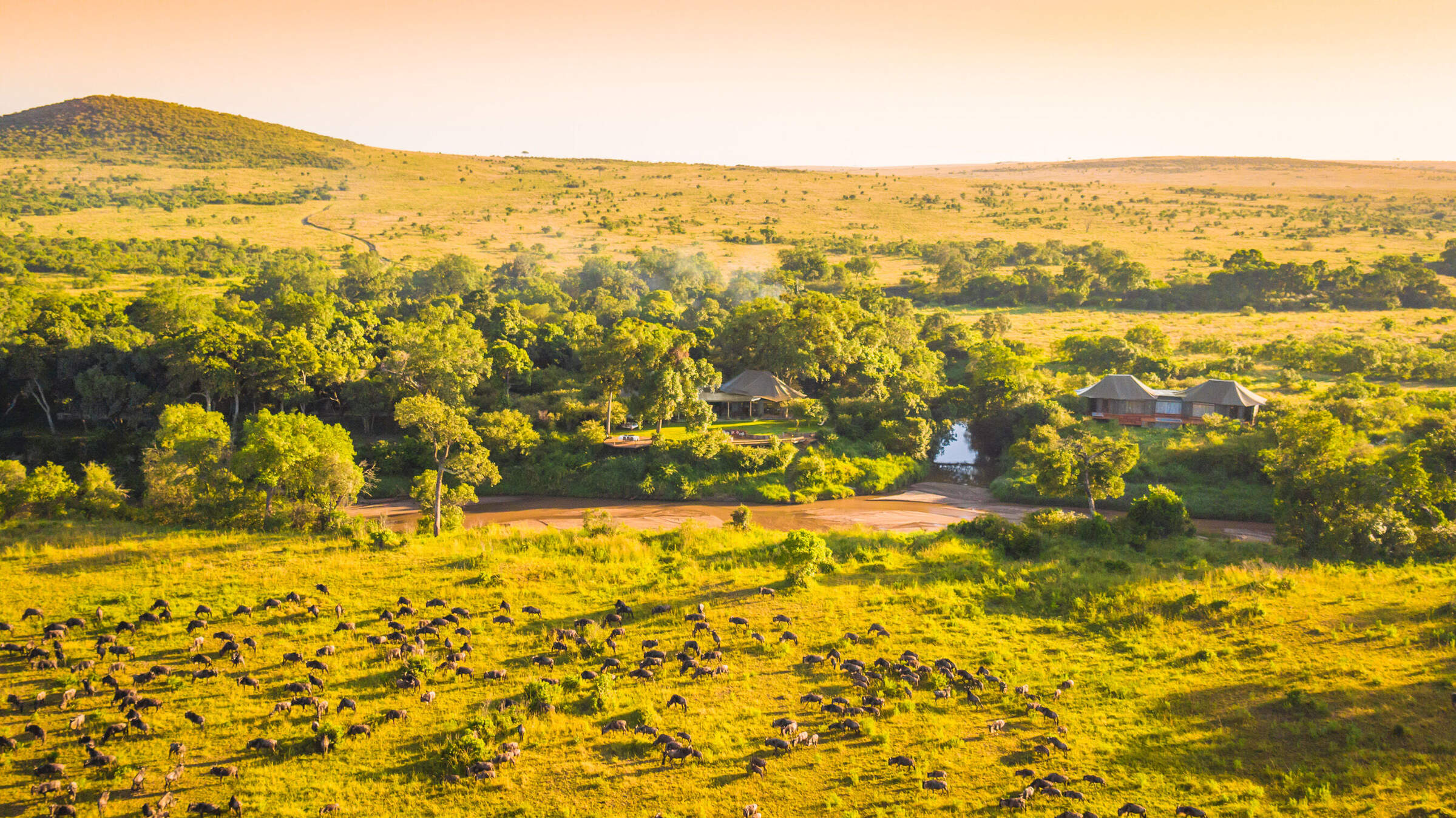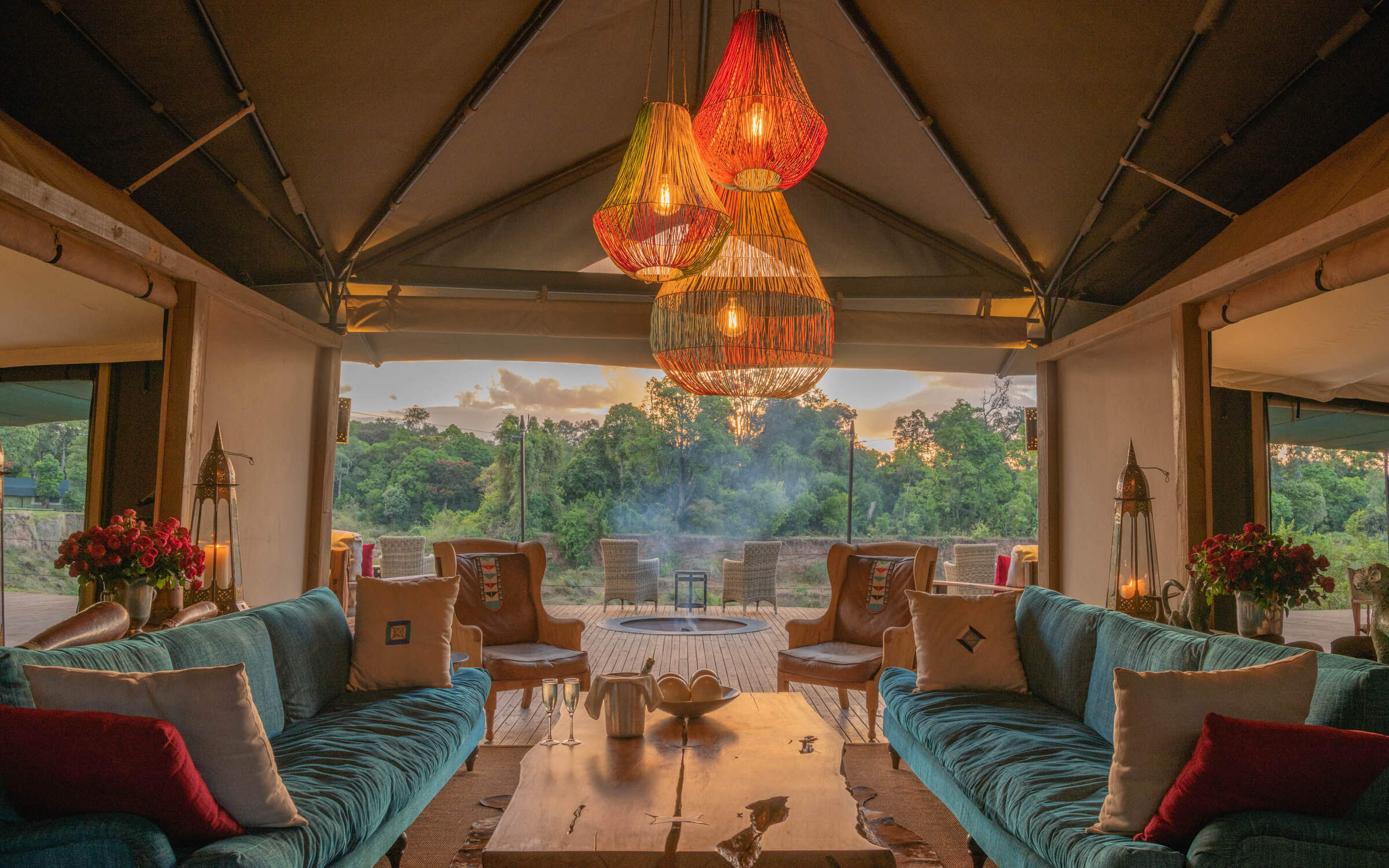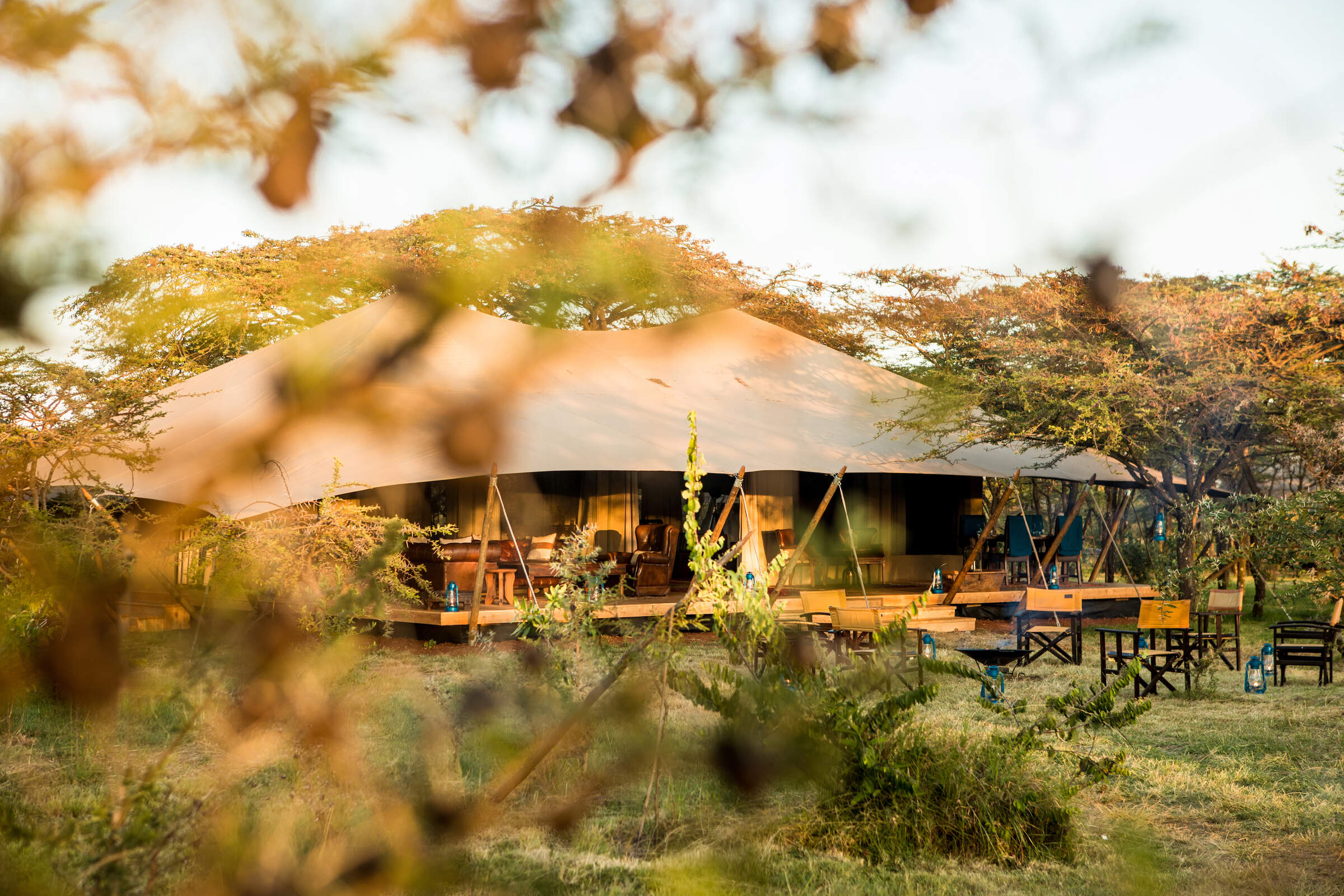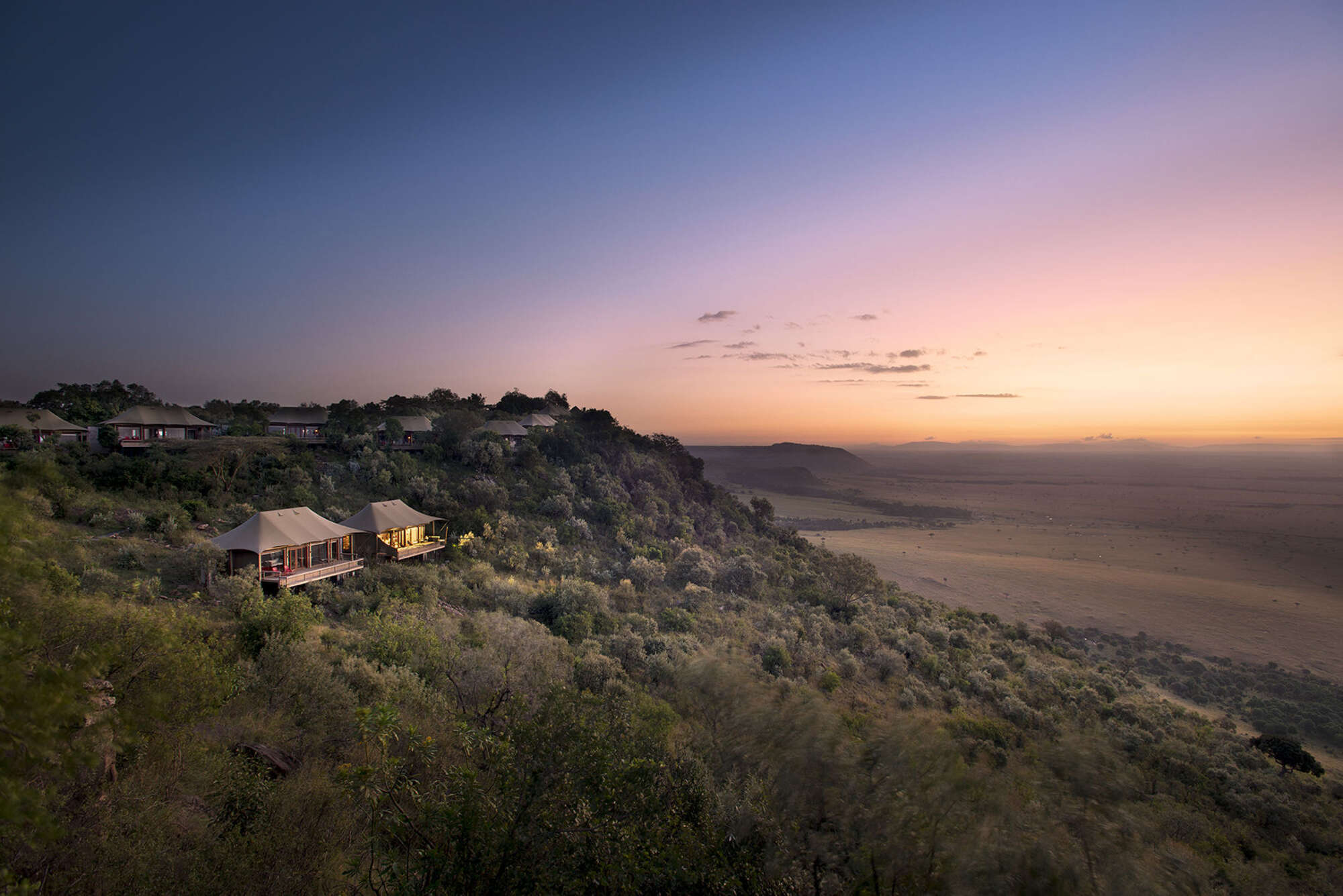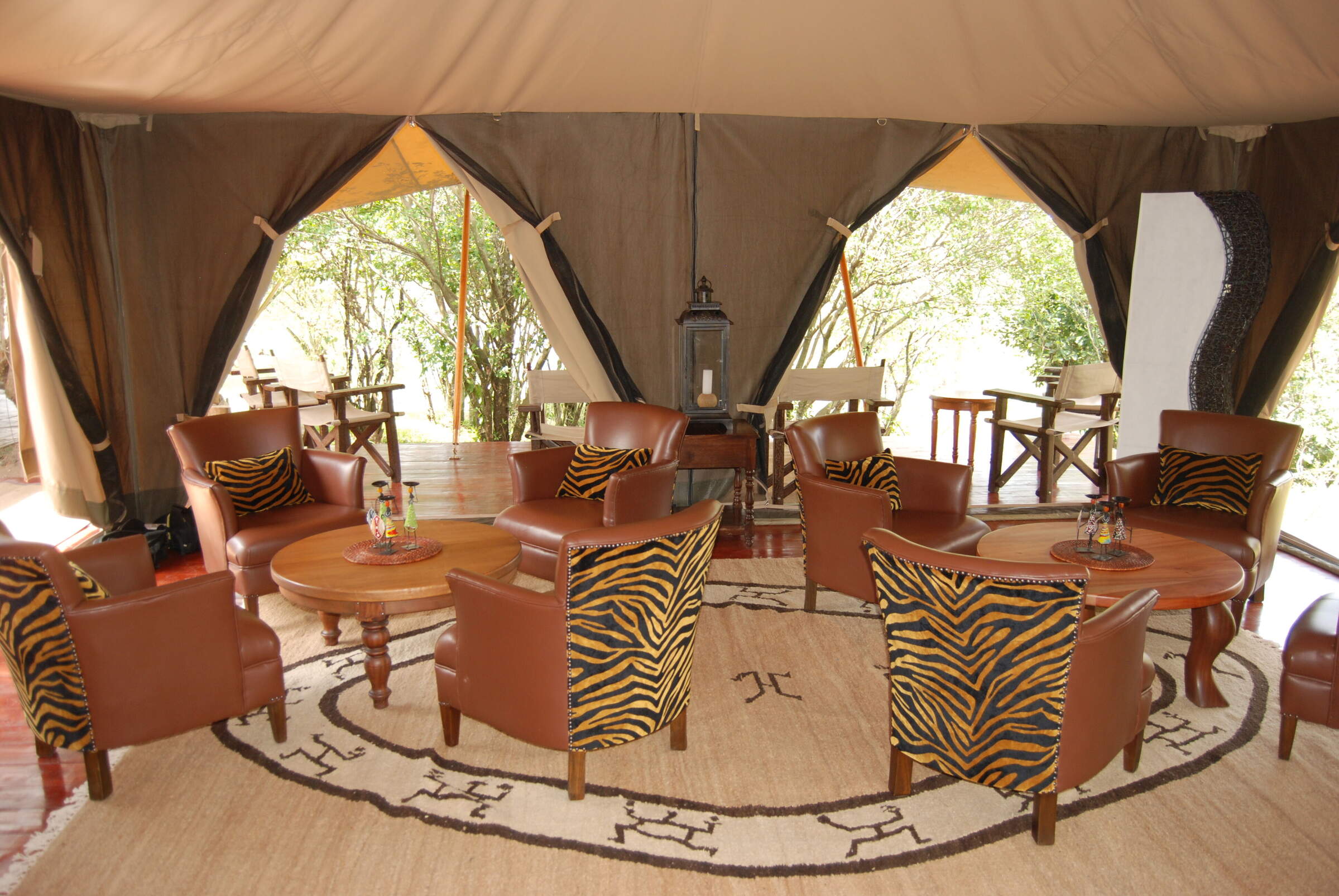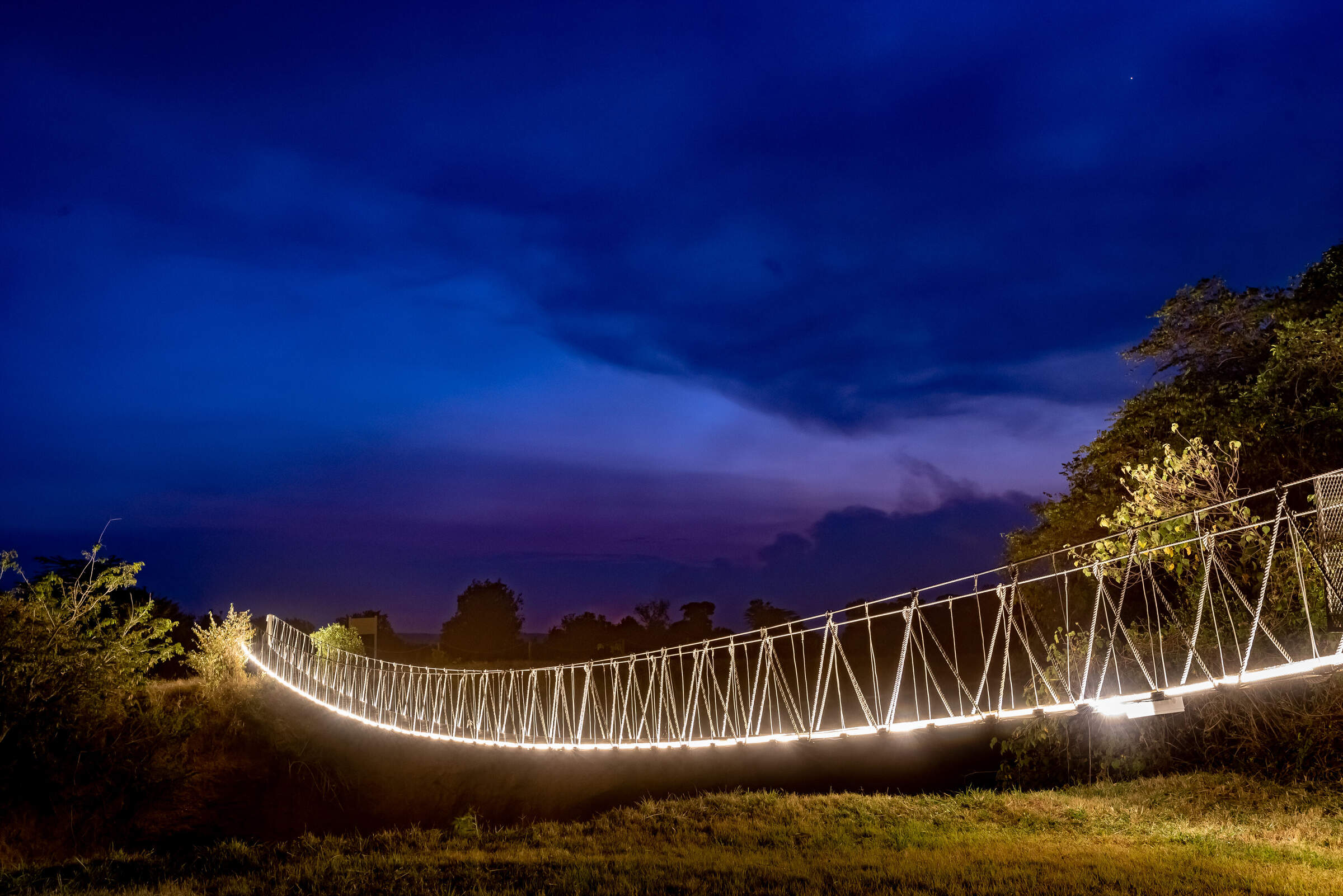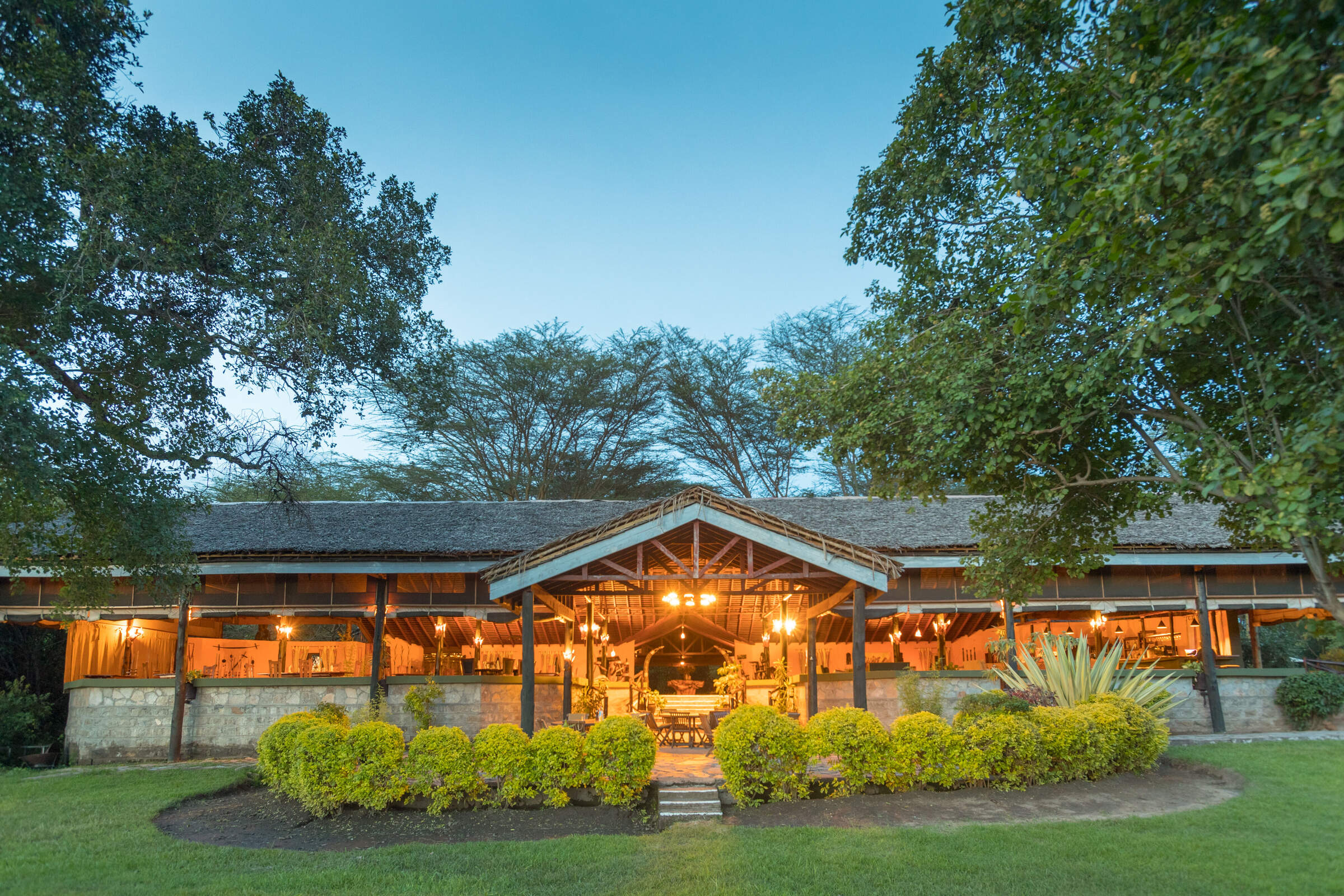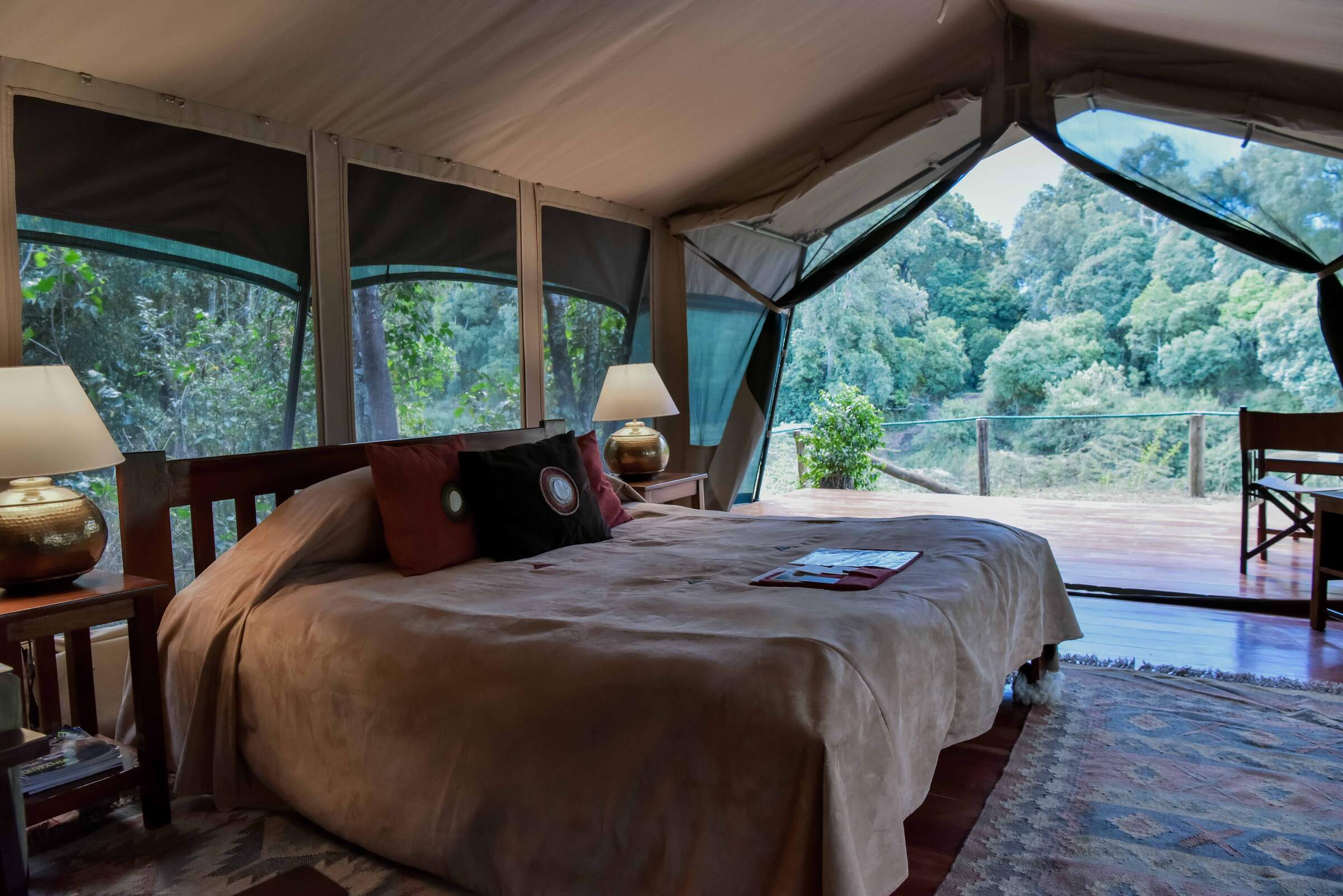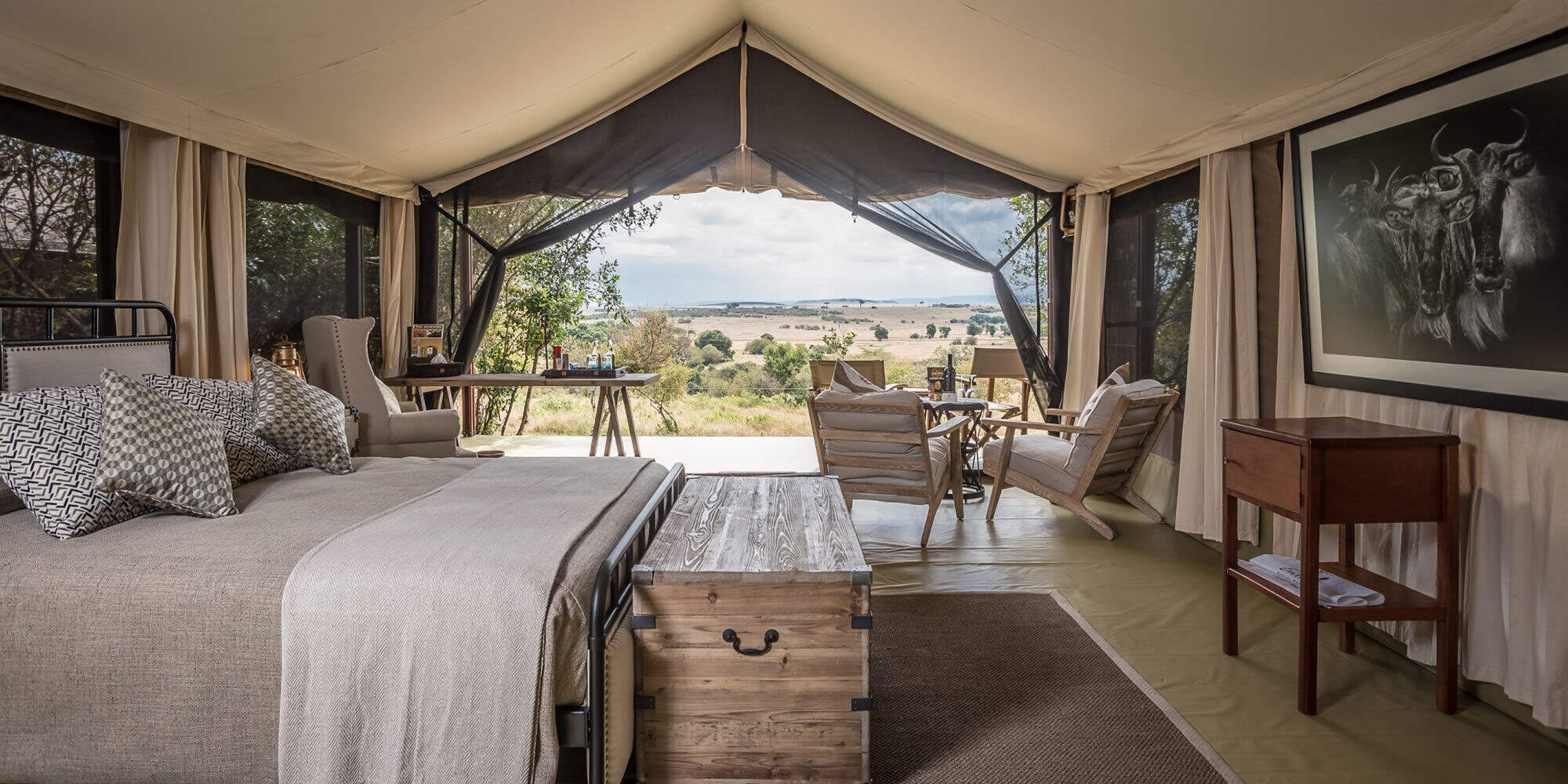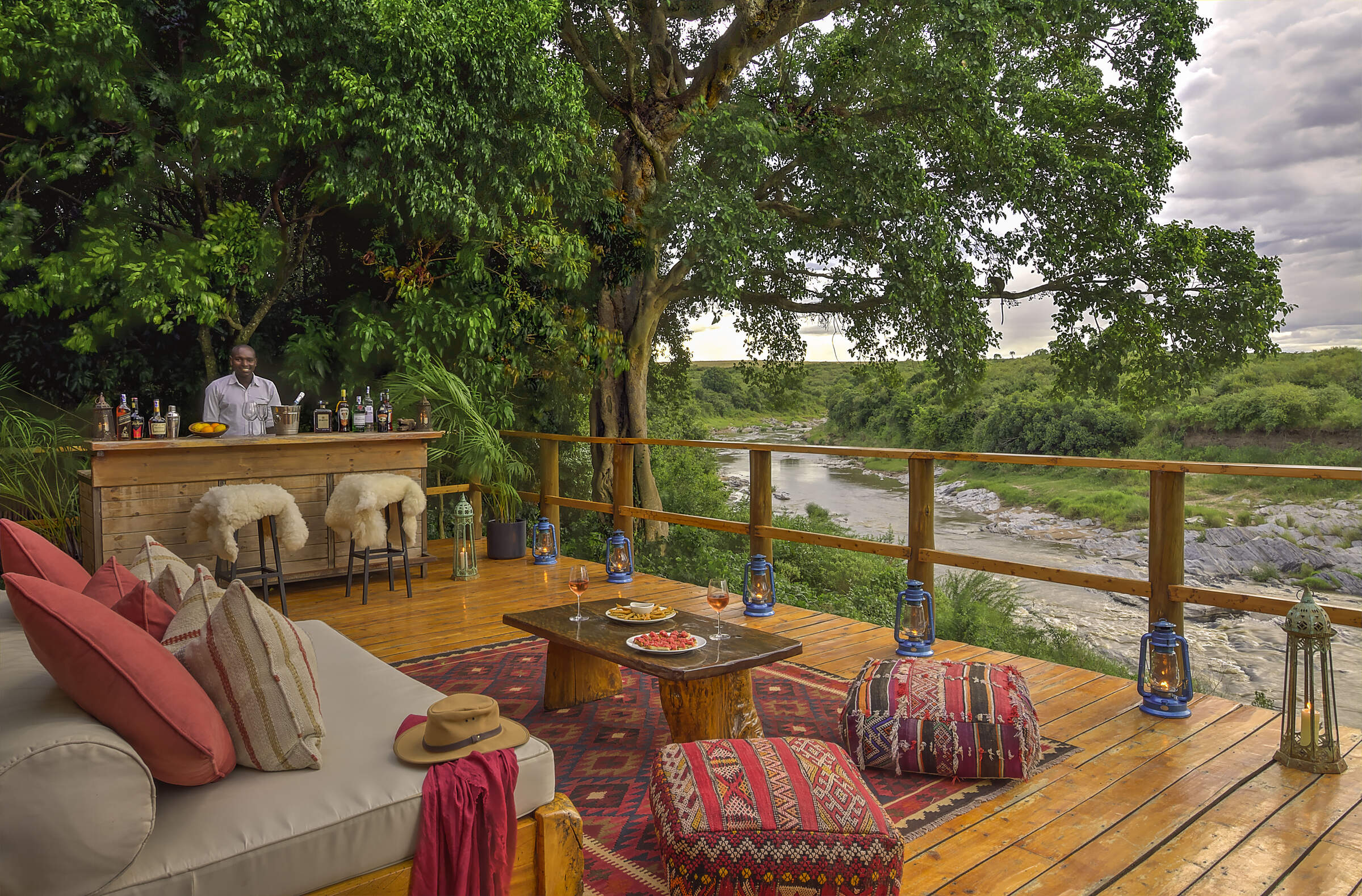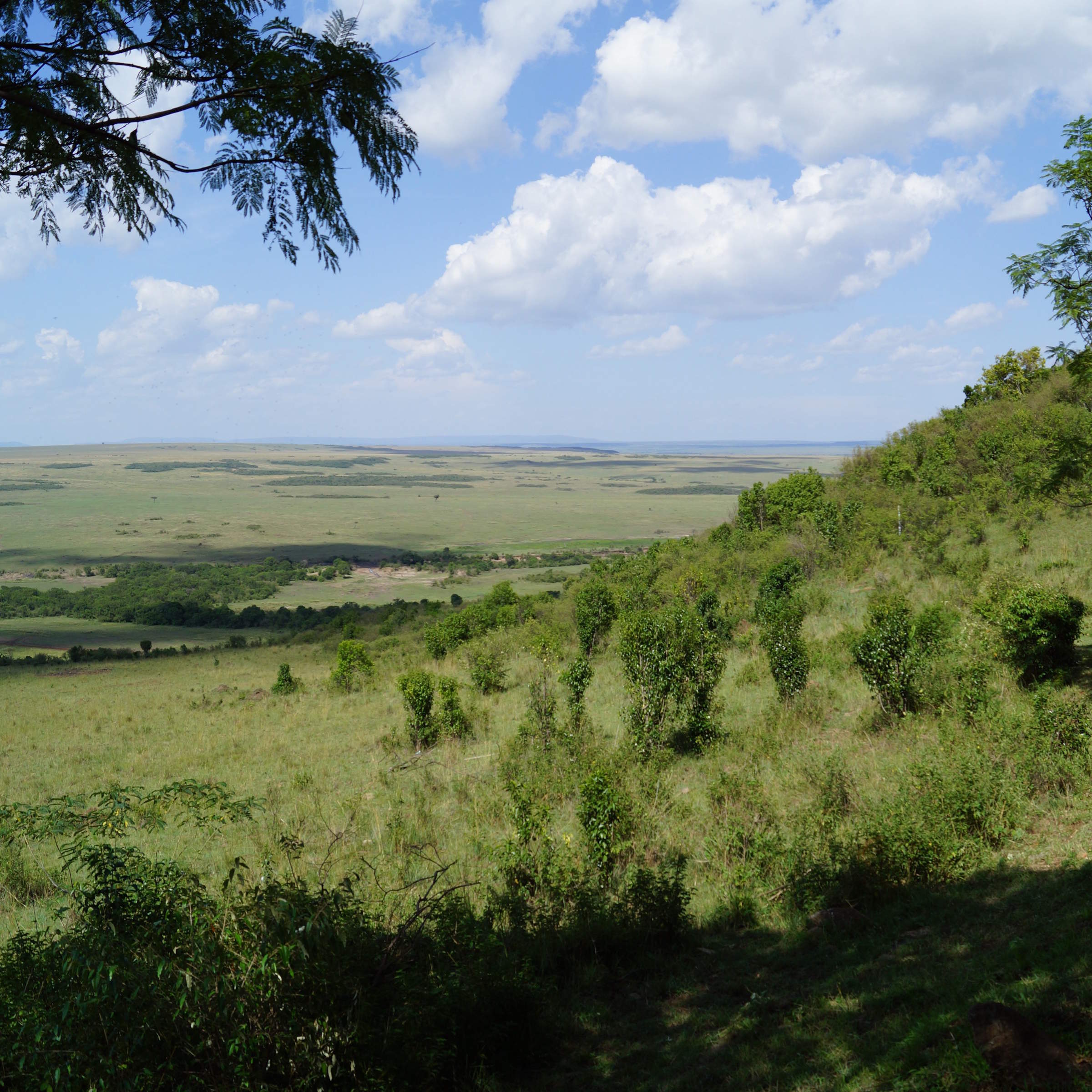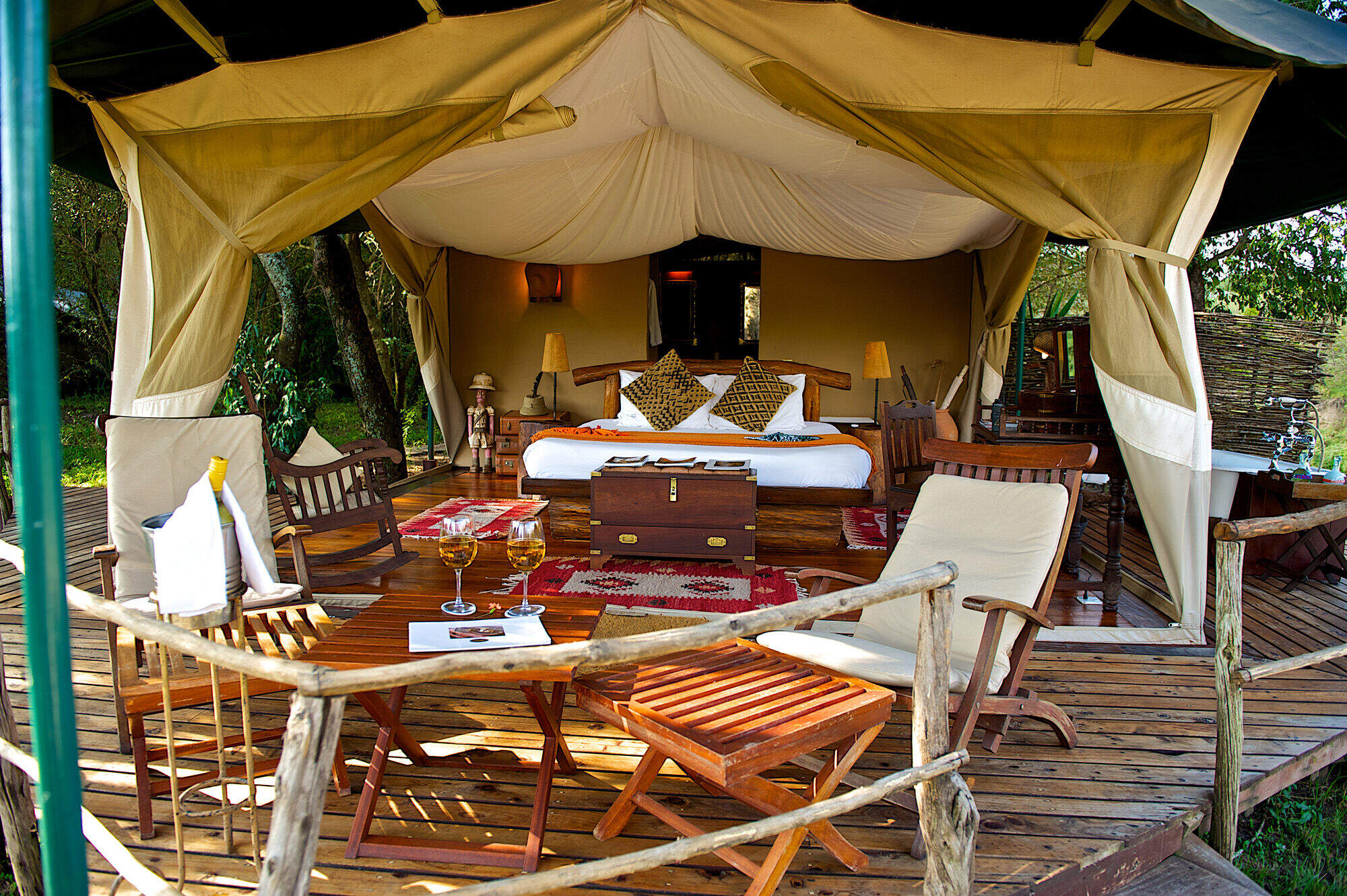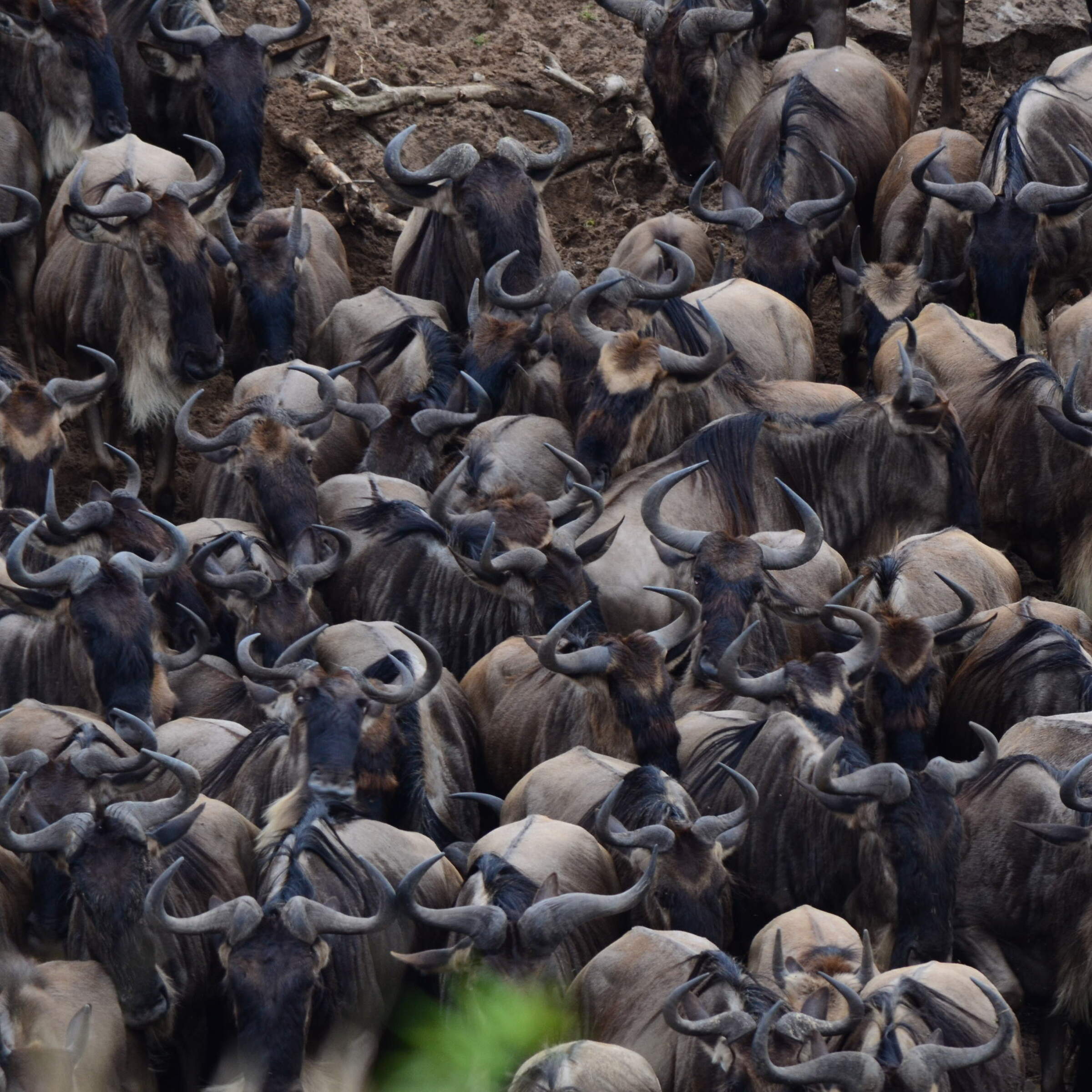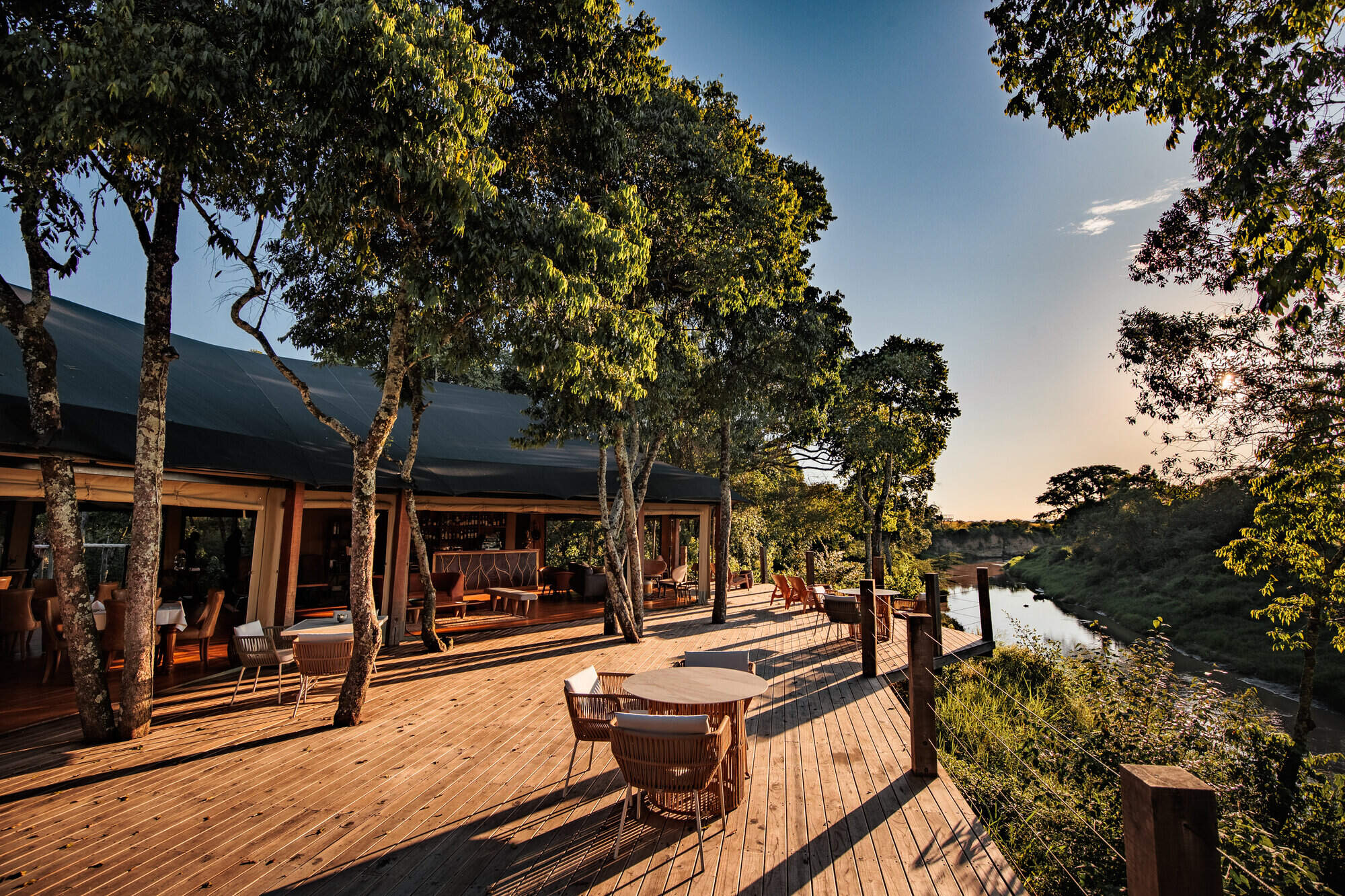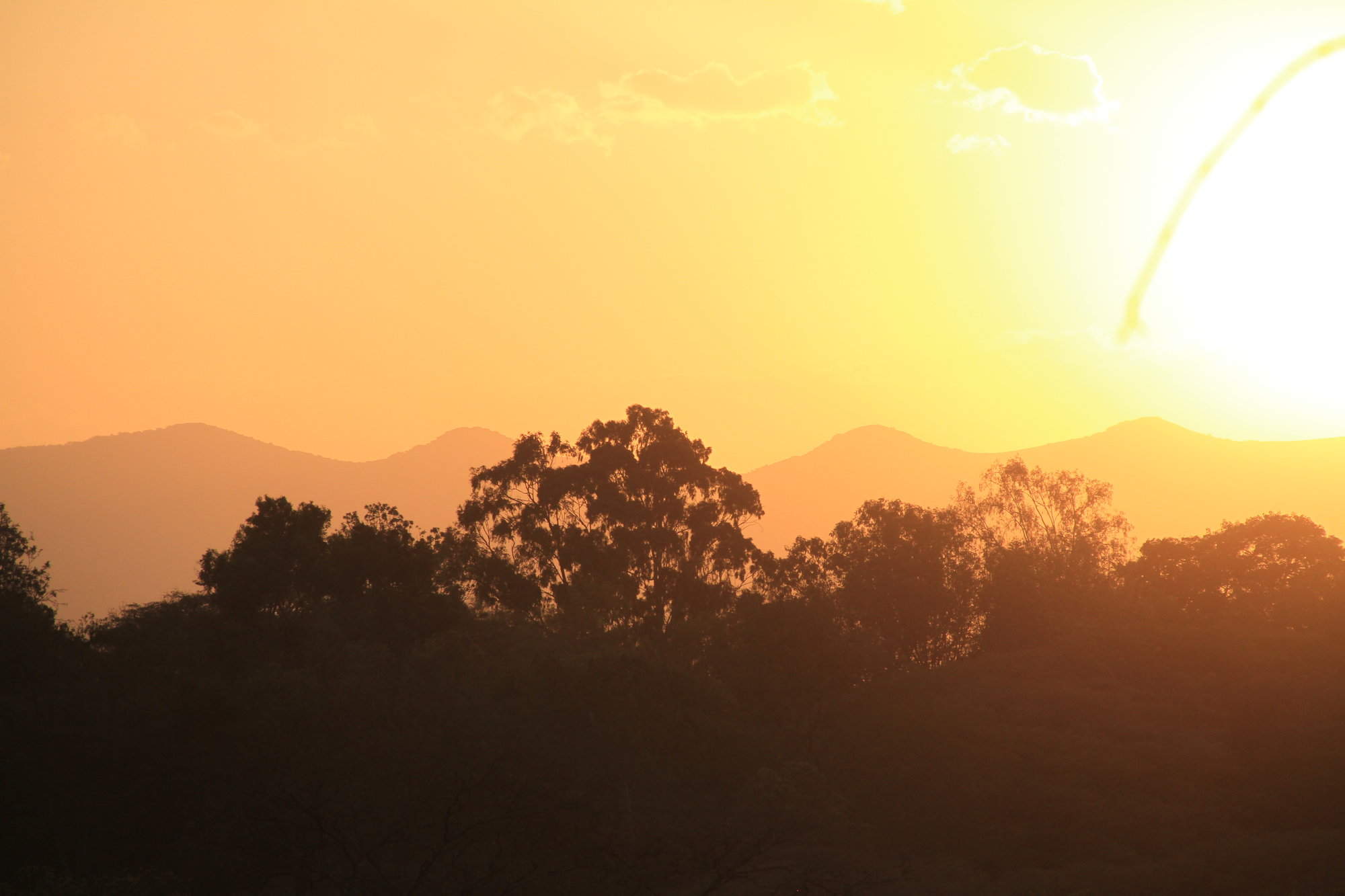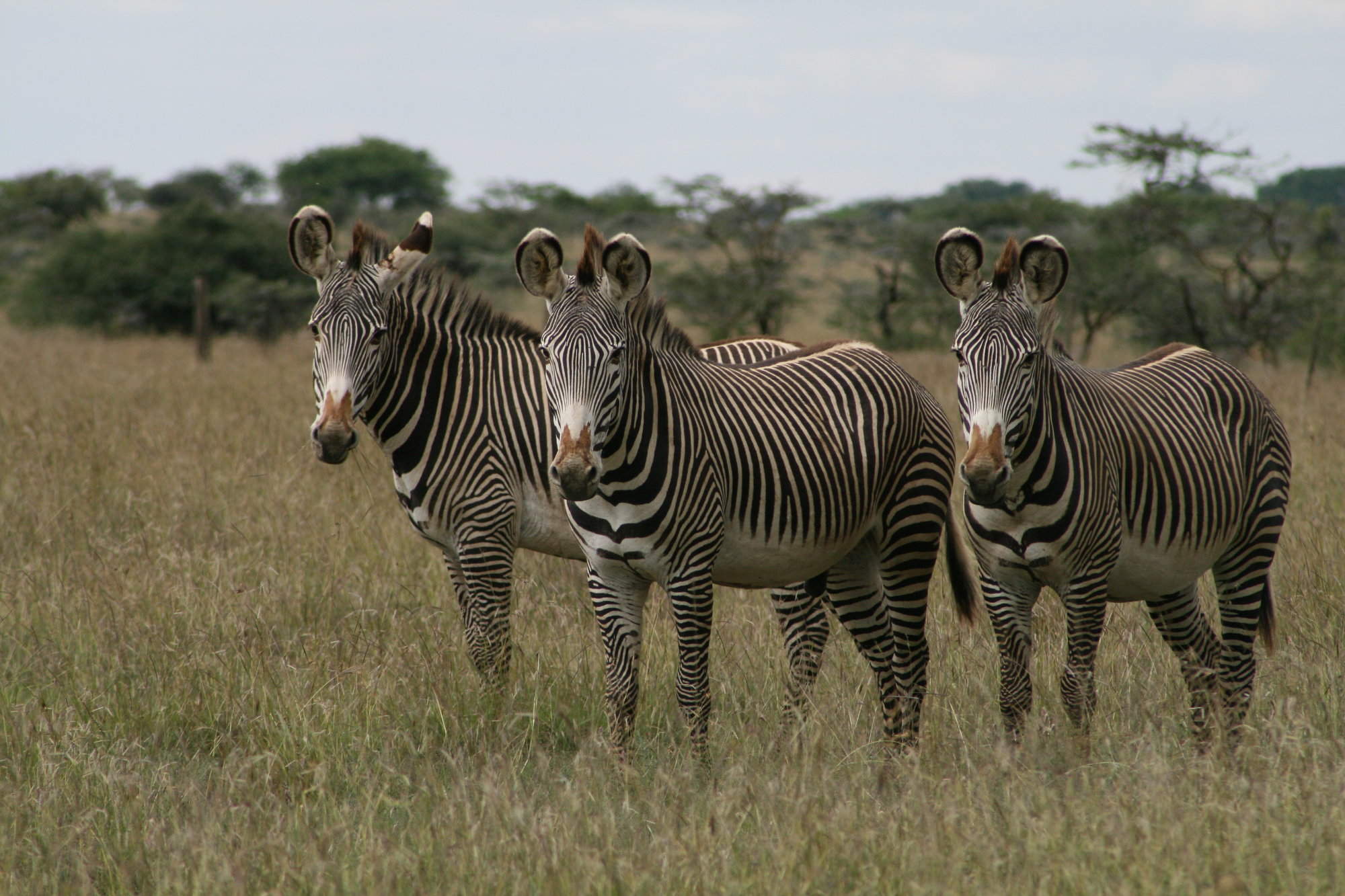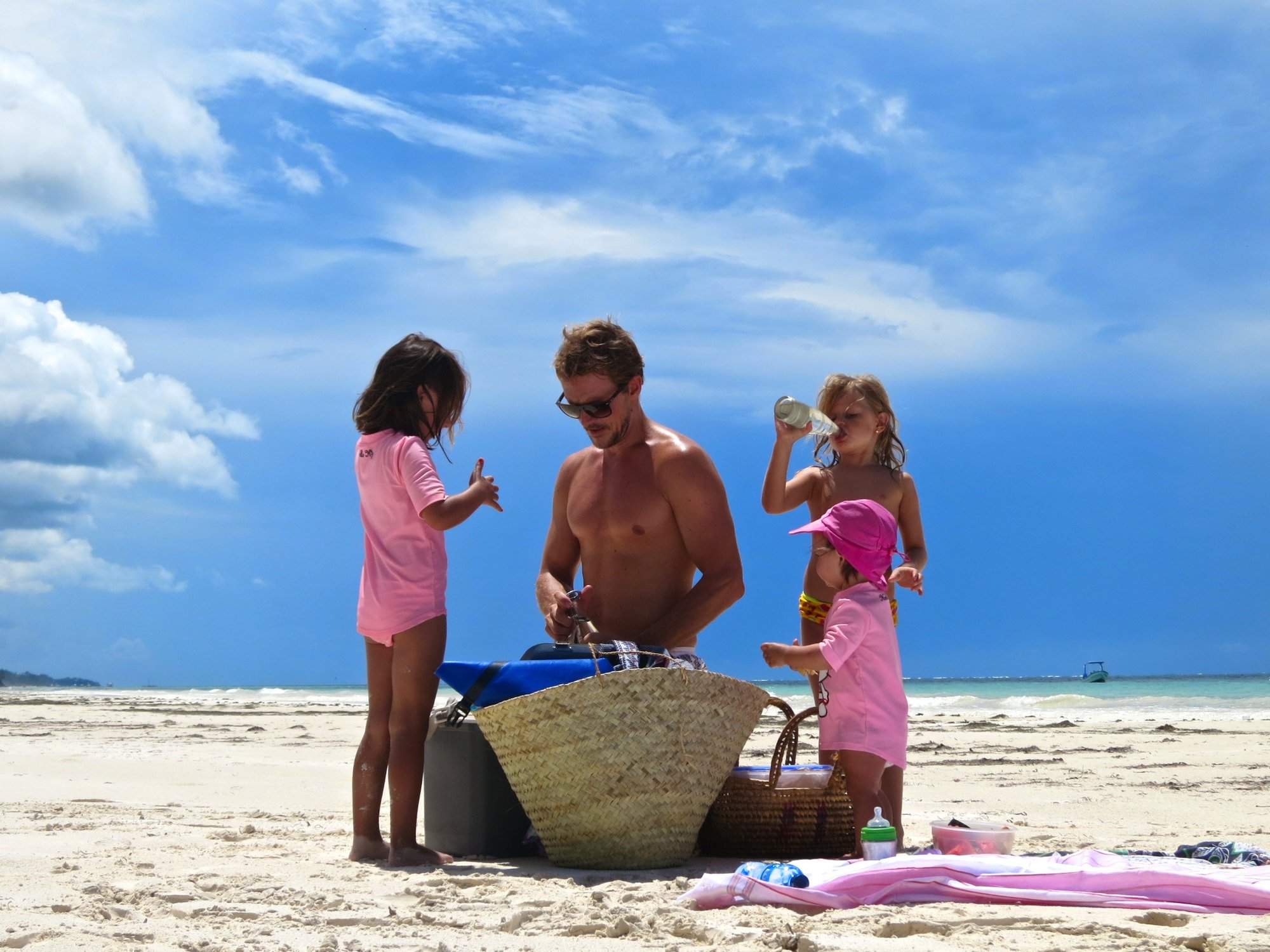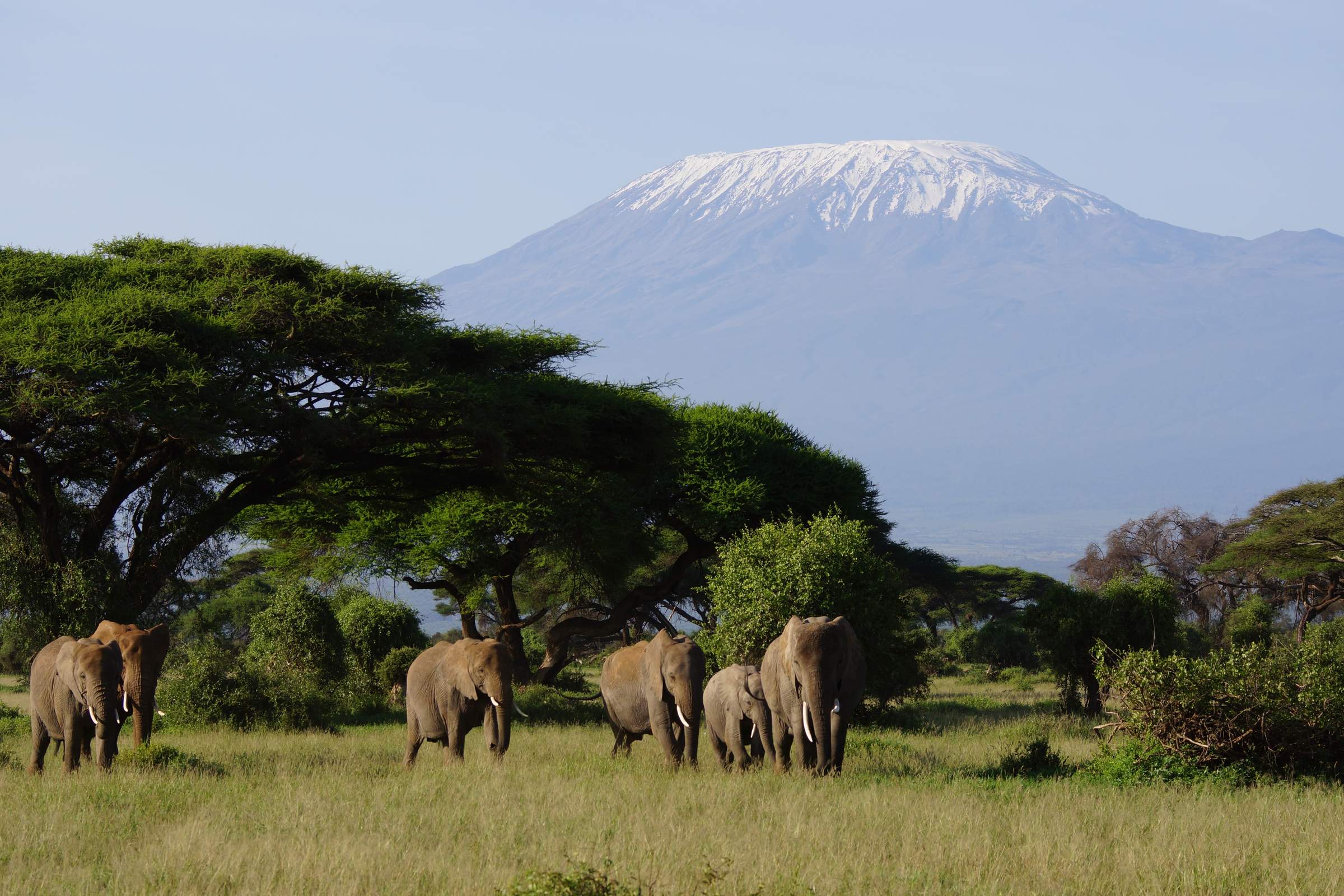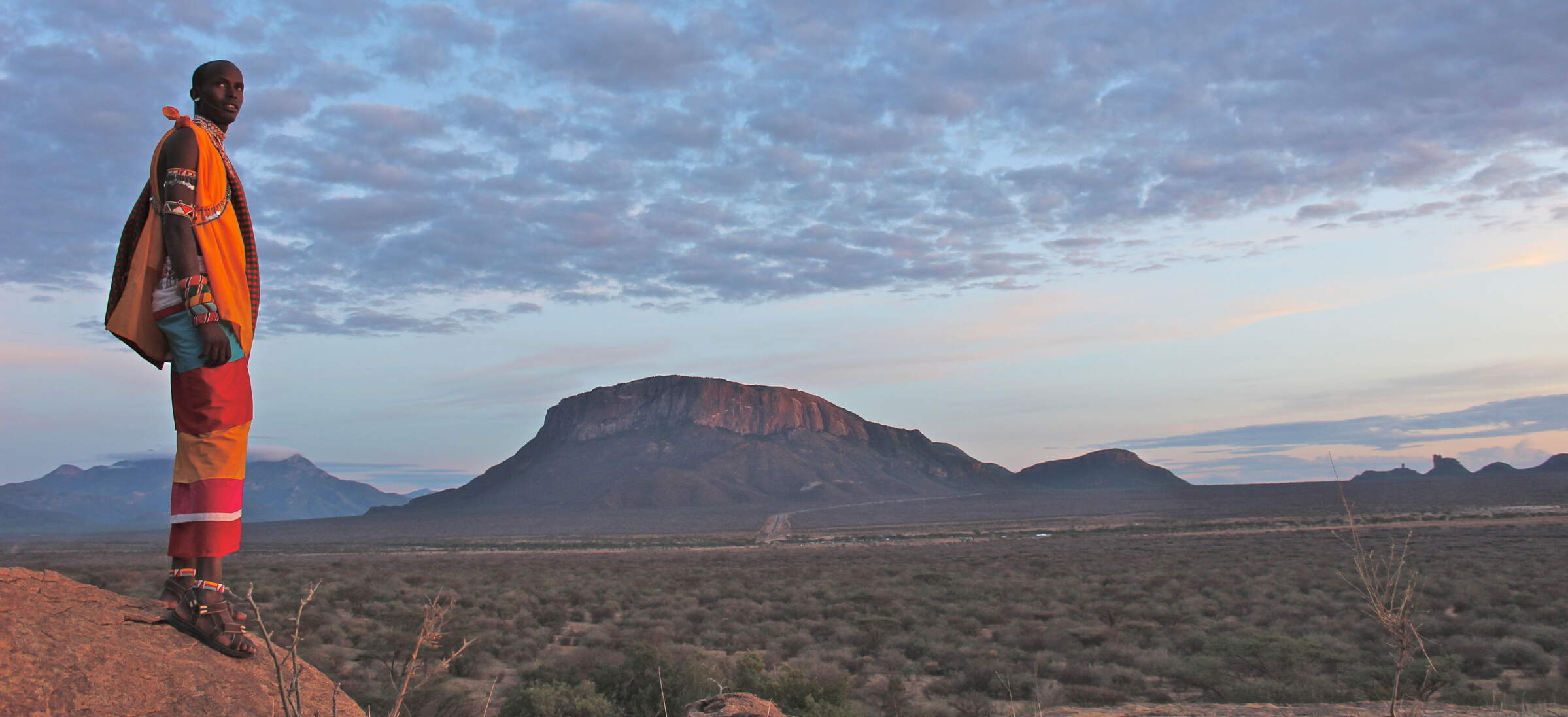Basecamp Maasai Mara: Our full report
A pioneering Mara eco-camp, opened in 1998, Basecamp Maasai Mara is a moderately sized tented camp in Koiyaki ...
... Group Ranch, just outside the Maasai Mara National Reserve. Close to Talek Gate and the small settlement of Talek, the camp is ranged in riverine forest along the north bank of the Talek River, which forms the reserve’s north-east boundary. The camp has direct access to the reserve via a private footbridge. Basecamp Maasai Mara achieved world fame in 2006 by hosting Barack Obama during his visit to Kenya two years before he became US president.There are now four Basecamps in Kenya, all in the Mara eco-system: as well as the original Basecamp Maasai Mara, the group operates and Basecamp Leopard Hill and Basecamp Eagle View in the Mara Naboisho Conservancy, about 45 minutes drive to the north, and its neighbour Basecamp Dorobo, a fly camp just 3km from Eagle View. Note that the subject of this review, Basecamp Maasai Mara, is also known as ‘Basecamp Masai Mara’, and used to be called ‘Basecamp Mara’. Is also sometimes referred to as the ‘Basecamp at Talek’, ‘Basecamp Explorer’ or ‘Main Basecamp’.
Although the immediate environs of the camp are over-grazed and its location, close to the settlement of Talek, is not the most exciting, once you’re through the camp gates, and particularly after you’ve gone through reception which physically separates the parking area from the main area of the camp – you enter a different environment altogether. Based around the ‘positive footprint’ concept, Basecamp Maasai Mara aims to put into its environment more than it takes out and they have planted more than 20,000 trees just outside the gates in recent years. Guests are welcome to visit the plantation.
The double-storey lounge and dining area is floored with crazy paving and is sheltered by high roofs made of tiles of local Kilgoris grass. Dining chairs are all the directors’ variety, which you may want to eschew as soon as your meal is over for a comfier seat – on one of the cushioned bunks downstairs or the simple sofas on the balcony. As well as the dining area and lounge, the Migration Bar offers a sit-up bar and bar stools.
Basecamp Maasai Mara’s 17 tents are set up on wooden platforms, dotted around the shady, wooded site, with plenty of space between each tent – no views of a row of parallel tents like a military encampment here. Each tent – large, rectangular and made of canvas and mosquito screen – rests on a much larger wooden deck, with recliners and hammocks to hand for whiling away the hot hours in the middle of the day. Sheltering the tent is a pitched roof of Kilgoris-grass tiles supported by wooden pillars, partly filled with pleasingly irregular walls constructed of wood and mud.
The grass-tiled roofs are renewed every two years, but the tents themselves are all original, and were certainly showing their age when we last inspected the camp. We understand that since we last visited the tents have undergone significant refurbishment. The tents offer either a king-size double or twin beds. The en-suite bathrooms are now more modern in design, and feature two solar heated showers (one outside and one inside). The old throne-like, composting toilets with no flush have now been replaced with a standard style bio-flush toilet.
Activities from Basecamp Maasai Mara major on game drives in the Sekenani sector of the Maasai Mara National Reserve. The camp uses closed vehicles with pop-top roofs. When the water in the Talek River is low, which it is most of the year, the footbridge from the camp into the reserve can be used, avoiding a 15-minute drive through the settlement of Talek at the start and finish of each game drive. Instead, guests walk with a guide to a vehicle pick-up point inside the reserve on the other side of the river, returning to the same point at the end of the game drive.
For those interested in local culture, school visits are on the agenda, and can be very worthwhile. The two-hour walks to the Talek community area include guidance on the local economy. Typically you either leave at 6.30am and come back for breakfast, or take breakfast with you and get back about 11.00am. A group of Maasai women in the camp make craft souvenirs under the ‘Basecamp Mara’ brand.
Basecamp Maasai Mara’s environmental credentials are impeccable: it is one of only three properties in the Maasai Mara and six in the whole of Kenya to have earned an Eco-Tourism Kenya gold award. Water comes from a 60,000-litre rainwater tank supplemented by a tanked-in supply (they are also studying a borehole proposal). They have a system that separates fat from water and they reuse all kitchen and tent grey water in their vegetable gardens. Toiletries are eco-friendly and the toilets are composting, dry toilets. Most of the camp’s power is supplied by three, 4m² solar panel units, each unit serving four tents. Very little concrete has been used in camp – and much of the building material consists of mud and sustainably sourced dead wood. If you’re interested, you can do a comprehensive tour of the camp, with a running commentary on its innovative and sustainable features. Be sure to visit the charcoal-cooled larder, where the camp stores its fruit and vegetables out of the heat – and safe from raiding monkeys.
Children will enjoy the camp’s relaxed approach, the river setting and the funky architecture of the tent platforms and their decks and bathrooms. The fig-tree platform – a delightful walkway and deck area overlooking the river – is a big hit with kids. This is not a fancy camp and has most appeal for the sort of people who approve of children getting involved in the environment and other cultures. There’s plenty of space for kids to kick a football around and generally let off steam. In other words children are not only welcomed by the camp but will feel welcome by most other guests.
Our view
As much as being a safari camp, Basecamp Explorer is an experiment in sustainable tourism – and it’s a successful one. You might not expect to find such a good example of environmental best practice in an area that is perhaps the most despoiled in the Mara eco-system, but it is clearly much loved and proudly cared-for by the staff. All game drives are conducted across the river in the reserve itself. Basecamp Maasai Mara’s pluses are affordability, accessibility and environmental responsibility. The main negative is that you are in a busy area with lots of other visitors around.
Geographics
- Location
- Maasai Mara National Reserve, Kenya
- Ideal length of stay
- 3–4 days
- Directions
- Ol Kiombo airstrip is 45 minutes’ drive from camp if you don’t stop for game-viewing.
- Accessible by
- Fly-and-Transfer
Food & drink
- Usual board basis
- Full Board & Activities
- Food quality
- During our stay in 2023, dinner served was soup with some fresh bread, main course was a vegetable curry with chapati and rice. To finish off dessert was a chocolate cake with ice cream with tea and coffee. The food was of a good standard. Vegetarians can be catered for but will need to make requests in advance.
- Dining style
- Individual Tables
- Dining locations
- Indoor and Outdoor Dining
- Further dining info, including room service
- Morning tea or coffee is served to the tents, and there is no problem having meals in your tent.
- Drinks included
- Drinks are separately charged in Kenya shillings: soft drinks Ksh150 ($1.50); beer Ksh300 ($3); glass of house wine Ksh450 ($4); spirits individually priced
Special interests
- Family holidays
- During a Kenyan family holiday at Basecamp Maasai Mara, children can join in with activities offered by the Dorobo club. This camp is a great example of eco-friendliness and cooperation with local communities, for ages 6+. Walks require children to be aged 15+.
- See ideas for Family holidays in Kenya
- Photography holidays
- Sitting on your deck with a camera at Basecamp Maasai Mara is always rewarding. Birds and monkeys often fill the trees near the tents, and there are areas in camp where you can get uninterrupted views across the Talek River to the herds of game in the reserve.
- See ideas for Photography holidays in Kenya
- Cultural experiences
- School visits are on the agenda here, and can be very worthwhile. The 2-hour walks around the Talek community area include background on the local economy. A group of women make souvenirs, and the proceeds of these go back to the community.
- See ideas for Cultural experiences in Kenya
Children
- Attitude towards children
- ‘We are a family place’
- Property’s age restrictions
- 15 is the minimum age for walks outside the camp.
- Special activities & services
- Children can take part in the Dorobo club: making bows and arrows, butterfly catching, skirt making and beadworks.
- Equipment
- Cots are available, but no highchairs.
- Generally recommended for children
- Yes, very much so.
- Notes
- Although the camp is fenced on the land side, there is open access to the river, so little ones must be under constant parental supervision.
Our travellers’ wildlife sightings from Basecamp Maasai Mara
Since mid-2018, many of our travellers who stayed at Basecamp Maasai Mara have kindly recorded their wildlife sightings and shared them with us. The results are below. Click an animal to see more, and here to see more on our methodology.

100% success

100% success

100% success

100% success

100% success

100% success

100% success

100% success

100% success

100% success

100% success

0% success

0% success

0% success

0% success

0% success
Communications
- Communications
- Guests can obtain a free WiFi password from reception. The camp has cellphone coverage.
- TV & radio
- None
Sustainability
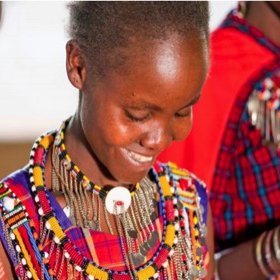
A base for the Maasai Beading Brand
Set at Basecamp Maasai Mara, next to Talek village, a fair-trade certified entrepreneurial initiative is empowering disadvantaged Maasai women and preserving the Maasai beading tradition. The Basecamp Maasai Brand (BMB) is a community-based handicraft workshop which provides a source of income to over 150 Maasai women, all between 17 and 60 years of age while indirectly benefitting about 600 people.
The artisans receive directly 55% of revenues, the rest covering salaries for the Management group and tools. The women are also involved in the pricing strategy, which takes into consideration the cultural significance of the product being sold. To date, 60% of the women have installed solar panels in their homes, covered education costs for their children up to secondary school level and bought water tanks which provide them with clean water. Additionally, the communal setting at the BMB workshop provides them with an appropriate environment for exchanging opinions and ideas.
In the last 3 years, BMB has grown financially and generated 7.5 million Kenyan Shillings (£57,000) in sales in 2017.
Products manufactured are high-quality and eco-conscious, using Maasai glass beads and leather as well as recycled or waste materials such as scrap metal. For example, a thread made from strands of recycled plastic food bags.
Guests can directly support Maasai artisans by visiting their workshop at Basecamp Masai Mara or purchasing products from Basecamp Explorer’s camps in Spitsbergen and Kenya. Donations are also encouraged as contribution to a goal of raising USD 20’000 for upgrading the BMB workshop site, enabling the Maasai women to introduce more designs and widen the range of their beading products.
See more great sustainability projects in Kenya
Health & safety
- Malarial protection recommended
- Yes
- Medical care
- The camp has a contract with the CMF clinic in Talek. In an emergency, guests would be evacuated by the Red Cross or Flying Doctors via Ol Kiombo airstrip.
- Dangerous animals
- High Risk
- Security measures
- There are whistles in the tents to attract attention in case of emergency. The camp is fenced on the land side, but not on the river side; ‘Beware the Crocodiles’ reads one sign. Askaris and armed police are usually on duty at night; an askari is usually on duty by day.
- Fire safety
- Fire extinguishers are positioned at every tent and there are three fire assembly points. Staff are trained by external trainers who visit every six months.
Activities
4WD Safari
Birdwatching
Cultural excursion
Guided walking safari
Hot air ballooning
Private activities
Extras
- Disabled access
- In Place
- Laundry facilities
- Full Laundry Service - Extra Charge
- Money
- Safe deposit at reception
- Accepted payment on location
- Cash payments may be made in US dollars, pounds sterling, or euros, as well as Kenyan shillings. Visa and MasterCard are accepted with a 4% surcharge.
Other lodges in Maasai Mara National Reserve
Alternative places to stay in this same area.

